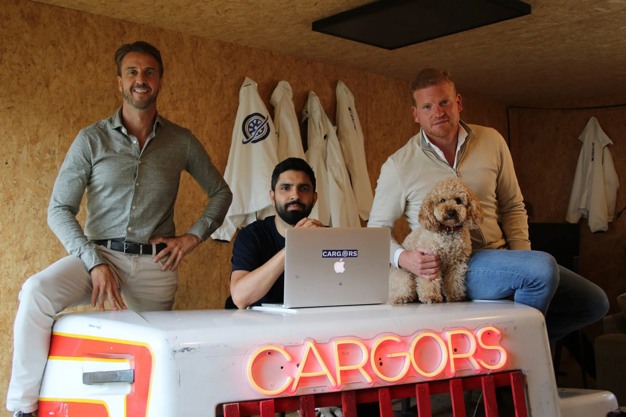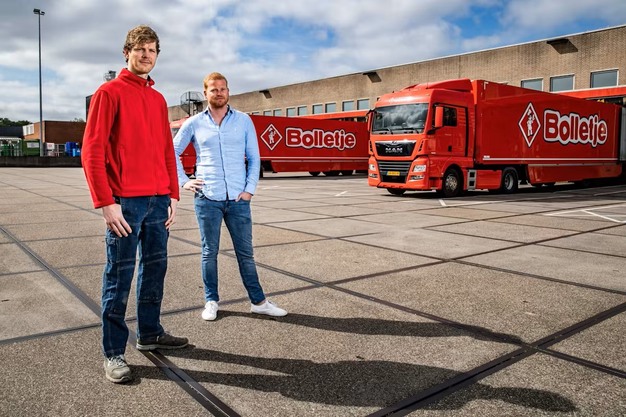"The transport sector is clinging to old ways, brokering and fragmentation, all of which is perpetuated by lack of digitalisation and therefore lack of transparency." It's how Tim Bosman, co-founder of start-up Cargors, looks at the transport sector. Together with his partner Najeeb Qazizada, the entrepreneur wants to sideline brokering by directly connecting shippers and carriers through smart software, so that everyone has full visibility of the market. "Not everyone is happy about this, but it is, in our opinion, necessary," he says.
"Please note that we are not a middleman, freight forwarder or platform, but a pure technology company that aims to create direct lines of communication between parties through algorithms, big data and AI," Tim warns. Meanwhile, the company was founded by the associates about two years ago and quickly caused quite a stir, as evidenced by one of Tim's stories about an unwanted visitor in his front garden. "He wanted to explain that he was not very happy with what we were doing. In the end, the police had to get involved."

Put simply, then, the start-up wants to link shippers with its own products directly to carriers with their own wheels. "My background was more in the tech world and Najeeb comes from operations logistics, but together we decided to look at the transport sector. This turned out to be way behind in terms of efficiency and digitalisation. This is where we wanted to offer a solution. Without third-party intervention, but therefore no influence from us either. The important thing about this story is that we do not act as a platform. After all, untold numbers of platforms have been launched in the transport sector over the past 10 years, but in fact this is almost always nothing more than a trader or forwarder in an online jacket. These kinds of middlemen are busy driving up prices on the shipper side and driving down prices on the carrier side, so that the margins they make remain huge. Carriers are often happy with margins going towards 10 per cent already, but we see that with these middlemen, these sometimes go up to times four."
"There is little to do against this because, as a shipper, you simply have no control over your own logistics. There is no transparency. Moreover, you have no freedom of choice about the transporter that shows up on your doorstep in relation to speciality or reliability and there is no direct communication possible with the transporter, so there is no relationship building either. In a nutshell, it is what we see happening in the transport sector."
Big project with Bolletje
"So what specifically are we doing? We are constantly working with 9 developers to build links with transporters through smart software," Tim explains. "By now, there are over 500 of them from, for example, renowned Dutch and Belgian guys, throughout Europe admittedly, that we have in our network. With those links, we are able to look at companies where they drive empty, where they drive half-empty, where there is imbalance, but also what areas they are good at, what materials they have, etc. We collect all those variables, so we can combine shipments through technology, but also optimise transport networks to achieve financial and sustainable benefits."

One major customer, with whom Cargors already works invariably, is Bolletje. "They will drive from Oldenzaal to supermarkets throughout the Netherlands every day, but they also drove back empty every day. We then look, or well, not we, but our software looks, to see if there are SMEs in the region whose products need to be brought back to the Oldenzaal region and link them directly. We set up a strategic project for Bolletje in this case, but in a similar way we also work a lot with spot orders from and for SMEs. That is total CO2 reduction, but also half the cost in the case of Bolletje. Moreover, the software allows us to look with companies at the imbalance within its transport operations. Some work with 6 or 7 transporters. All through e-mail or other ways, but we want to centralise this within Cargors. It soon became clear that we could save substantially on costs, but also reduce and record the entire CO2 emissions, which is of course very important again towards 2025 in the transport sector."
"It sounds very simple, because from the outside, transport just looks like driving a product from A to B, but there are so many variables involved. Temperature, types of material a transporter uses, transshipment days. Thousands of different variables, which makes it very difficult to create these links. However, I think we have succeeded, and now we are making more and more strides with big names. The more data, the more efficient we can work. That digitisation battle seems to be happening now."
Conditioned AGF transport
So with this, Cargors started with dry goods, but is now also growing steadily in the AGF sector. "Dry cargo was of course the core in the beginning. In that, our network now also has total coverage, but we are also increasingly dressing up conditioned transport. We are now sitting on a share of AGF of around 12 per cent. Conditioned requires a different approach, of course. Of course, you can't throw leaking engines into a Bolletje truck in dry goods either, but with fresh produce you're dealing with differences in temperatures and materials, which makes it quite a challenge. However, there is all the more imbalance here, which is why we also see the need here."

"Think, for example, of mandarins from Spain. These come to the Netherlands every day for months, but then go back largely empty. This is totally unused, because transporters fight each other out of business. They keep it all closed and don't work together. That doesn't help efficiency, but what if you can have Dutch product to drive back to Spain with you. It is a challenge, but the more companies join, the more direct lines we can establish. By now, all countries within our network are covered, but of course we want to be able to do double puzzles to enable even more combinations. The more data, the better."
Kicking against the establishment
For the future, then, Tim sees the main interest in expanding the network. "Look, it is of course a bit of a kick to the establishment, but by now we are to the point where hauliers are also knocking on our door. Of course, we have two target groups: shippers, but also transporters. So it is very nice that many of them now also see that we can actually help them reduce margins and increase efficiency. So every month our network strengthens, and we are steadily trying to adopt companies with their own trucks, but also large transport companies. Through that combination, we believe we can create added value, but it is a long-term process. Really a long haul, because innovation is scary for many, but necessary."
For more information:
Tim Bosman
Cargors
+31(0)207008367
operations@cargors.com
www.cargors.com
